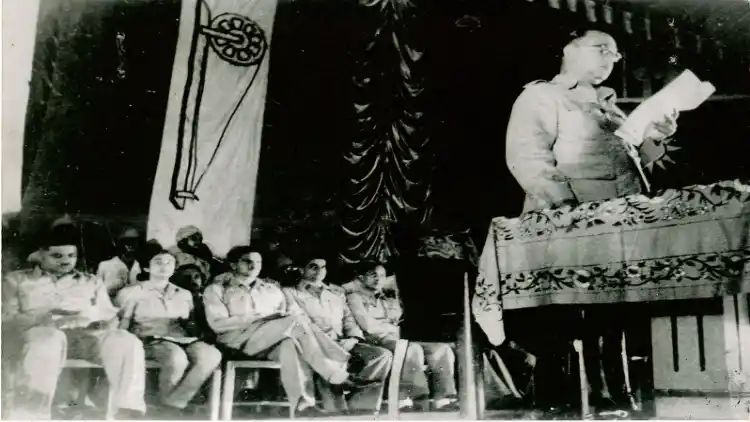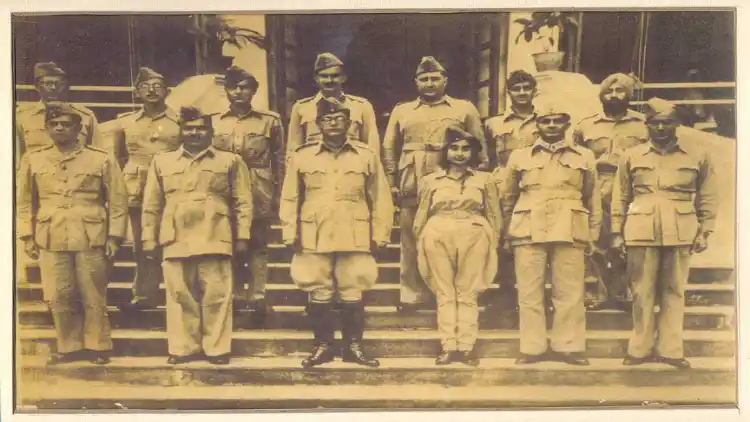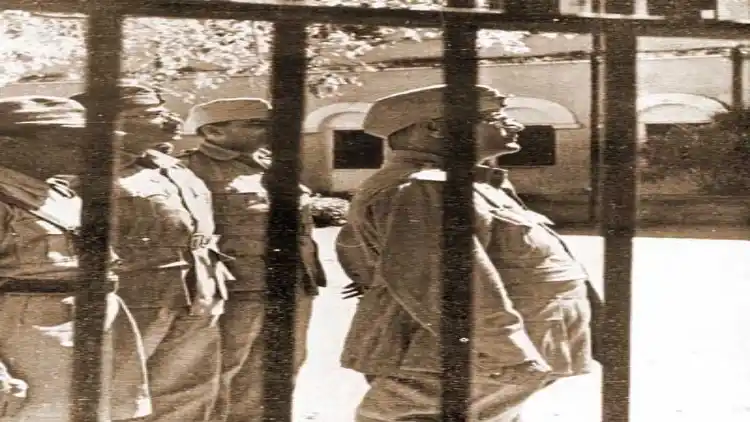
 Saquib Salim
Saquib Salim
“In the name of God, in the name of bygone generations who have welded the Indian people into one nation and in the name of dead heroes who have bequeathed to us a tradition of heroism and self-sacrifice, we call upon the Indian people to rally round one banner and to strive for India’s freedom. We call upon them to launch the final struggle against the British and all their Allies in India and to prosecute that struggle with valour and perseverance and with full faith in final Victory until the enemy is expelled from India’s soil and. the Indian people are once again a Free Nation.”
With these words, Netaji Subhas Chandra Bose announced the formation of Arzi Hukukmat-e-Azad Hind (Provisional Government of Free India) in Singapore on 21 October 1943. He took oath as the Prime Minister of the government in presence of hundreds of people and swore to fight till the last drop of his blood. This was an emotional moment, where despite trying best to control the emotions Netaji broke down. Tears were welling from the eyes of all those who had assembled to be witness to this historic and emotional event.

Netaji Subhash Chandra Bose with his team of Azad Hind Government in 1943
Today, we remember Netaji, and his government, not because he led an army of thousands of Indians against the British but because of the ideals and principles he stood for. First of all, we should remember that this government was of an undivided India something that in the present times would mean - India, Pakistan, and Bangladesh. A visionary, he predicted in 1938 that the British Empire would divide India along religious lines before transferring the political power to the Indians to neutralize the positive effects of political freedom.
He often reiterated that 1857 was the first major threat to imperialism in India because most of the Indians united against the foreign rule. With this, the British government adopted a policy of dividing Indians into religions, castes, regions, and languages. Azad Hind Sarkar provided a counter to the British policies.
In the words of Abid Hasan Safrani, a close confidante and secretary of Netaji, “What I wondered was the force that united us, we who were otherwise so different one from the other, individually and in smaller groups? Regions had kept us apart and our religions, our castes, and customs and our separate traditions. Yes, especially our separate traditions which our petty leaders knew well to exploit to enhance their cause and weaken ours. But did all these differences matter? Yes, they did in the absence of any other ideology. What distinguished us in our column, as indeed in the whole of the Azad Hind Movement, both in its civil and military wings, was that we had an ideology, a national ideology….. not tinged with any other sentiment religious or regional.”
Abid further stated, “We in separated groups did not count. We, however, did count the moment we became part of the whole. This all-embracing India we took upon ourselves to establish. This became our purpose in life.”

Azad Hind officials inspecting the cellular jail in 1944
At a time when politicians in India were debating over religious issues rather than the national ones and had divided themselves into Hindu, Muslim, Sikh, and caste-based political outfits, Netaji united them into one. India was the goal and they understood it. In his proclamation of the government, Netaji said, “It (the government) guarantees religious liberty as well as equal rights and equal opportunities to all its citizens. It declares its firm resolve to pursue the happiness and prosperity of the whole nation and of all its parts, treating all the children of the nation equally and transcending all the differences cunningly fostered by an alien government in the past.”
Netaji was a man of action and did not believe in lip service. On the same day along with him, a cabinet of ministers
also took an oath, it consisted of Hindus, Muslims, Sikhs, Tamils, Bengalis, and people of every group. Karim Ghani, Shah Nawaz, D.M Khan, Ehsan Qadir, M.Z Kiani, and Aziz Ahmad took oath as ministers at a time when Jinnah was asking Indian Muslims to keep themselves away from a united struggle for freedom. Besides, Netaji’s secretary Abid Hasan and second in command Habib ur Rahman were other prominent Muslims of Azad Hind Fauj (Indian National Army). Sardar Ishwar Singh and Gulazara Singh were prominent Sikhs in this 2-member cabinet of ministers and advisers.
Azad Hind Sarkar conceptualized India in its real spirit, where people of religions, languages, and regions lived together as one nation. It rejected the idea of divided nations within India and discord among communities as propagated by the British imperialists. Today, we need to read, understand and propagate the ideals of Netaji and his Azad Hind Sarkar more than ever before.
(Saquib Salim is a Writer and a Historian)
